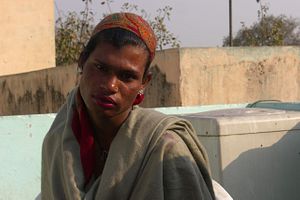The 2011 Indian census estimates the country’s transgender population to be over 500,000 and trans activists declare that the number is much higher. While exact numbers continue to remain unknown, what is obvious is the degree of discrimination the community faces in attempting to secure their basic rights to life, safety, and livelihood. The first big step towards remedial measures came about in February 2014, when the Supreme Court (in what is known as the NALSA verdict) recognized ‘transgender’ as a gender identity and called for immediate remedial action. This inspired hope in the community and among their supporters, but the pace of change does not quite seem to match the speed or steadiness that some hoped for in the wake of the verdict.
In July this year, a writ petition was filed on behalf of the transgender community, contesting Section 377 of the Indian Penal Code, which criminalized “unnatural sex” (and thus specifically discriminated against the sexual preferences of the Lesbian, Gay, Bisexual and Transgender (LGBT) community) on grounds that it violated the life, autonomy, and dignity of transgender people, as well as their attempts at gaining equality before law and within society and gaining freedom of expression. This petition comes ahead of a discussion of the ‘Rights of Transgender Persons’ Bill (Transgender Rights Bill 2016) in the Lok Sabha (the lower house of the Indian Parliament).
The Transgender Rights Bill 2016 is based on a private member’s bill that passed unanimously in the Rajya Sabha, or the upper house of the Indian Parliament, in April 2015. At that point, the government said that it would be brought into the lower house after it had “correct[ed] infirmities” and circulated its own revised draft among ministries. This process began in March 2016, when the draft Transgender Rights Bill 2016 was circulated by the Ministry of Social Justice and Empowerment for inter-ministerial consultation for two weeks. Although the comments were inadequately forthcoming, the bill was sent to the law ministry (prior to being sent for cabinet approval) in April.
Some themes that this bill was expected to address included the question of what exactly counted as “atrocities” against transgender persons, what their means of redress would be, and what punishment the perpetrator(s) would face. It would also look at the question of reservations in jobs and academic institutions for transgender people, remedial measures against their wrongful dispossession and attempt to look at their access to scholarships.
However, since the Lok Sabha placed this bill on its agenda last week, the draft that has been in circulation has been decried by representatives, activists, and legal scholars alike – the consensus suggesting that it was fully open to the exploitation of loopholes and misinterpretation, with several activists noting that the Rajya Sabha Bill passed earlier, though not ideal by itself, was definitely better and preferable to this one.
For starters, the Transgender Rights Bill 2016 runs into issues of defining who a transgender person is. While the NALSA verdict indicated that anyone who did not identify with the gender assigned to them by birth could choose to identify as transgender without needing a physical examination and certification, the new bill undoes this possibility both in spirit and in practice.
In spirit, it offers a very problematic definition: “transgender person,” per the bill, is defined as a person who is (A) neither wholly female nor wholly male; (B) a combination of female or male; or (C) neither female nor male. By defining the transgender experience either in the negative (as “not” male or female) or in parts (as “neither wholly” or as a “combination”) it takes away the rights of the peoples to self determine how they wish to be identified – for instance, as just male or as just female or as a third gender category or anything outside of the three narrow suggestions the draft makes.
This is worsened by the draft’s “screening committees,” which feature doctors who will provide certificates for those who identify as transgender. Not only does such a policy entirely ruin the spirit of self determination, it also puts in place a surveillance and gate-keeping mechanism for an already severely discriminated-against community.
Transgender people face a range of abuses in India today. They may be evicted or fired without warning, and, when disowned by families, may lack the means to avail of education. They are often abused as laborers. The Transgender Rights Bill 2016 does not have a clear grievance redressal mechanism and, in addition to being ambiguous about the methods individuals must follow to seek justice, limits the jail sentence that the offender may receive to just two years.
Finally, the bill does not talk of reservations in educational institutions for members of the transgender community who do not belong to the Scheduled Castes or Scheduled Tribes (although it was expected to provide for them under the category of Other Backward Classes, it has not). It is silent on the count of police violence against the community, which serves as an important reason why the community is relegated to the margins in India. A full list of the community’s problems with the bill has been addressed in detail in a public response authored by multiple groups that are by and for sexual minorities.
Celebrating the discussion of this bill in the Lok Sabha is perhaps very preliminary as, at best, the Transgender Rights Bill 2016 is grossly ignorant of the very issues it is attempting to address. At worst, it is potentially abusive.

































